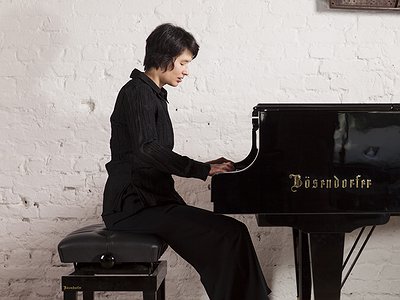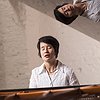There are many descriptions of the ideal state of mind for being creative. What is it like for you? What supports this ideal state of mind and what are distractions? Are there strategies to enter into this state more easily?
I can only tell you that the laundry needs to be done, the kitchen clean, the phones turned off, and ideally there should be clouds in the sky. Bonus creativity if there is snow on the ground as well.
How do you make use of technology? In terms of the feedback mechanism between technology and creativity, what do humans excel at, what do machines excel at?
My projects have all had interesting technological components to them, like cool notation software, internet streaming, and even pianos that can play themselves. This is a result of collaborations with my husband, and with people like Thomas Bonte from MuseScore.com who understand technology. I leave the technology to them. For me, a technological improvement is a pencil that doesn't break, and an eraser that doesn't make crumbs that get between my piano keys.
Collaborations can take on many forms. What role do they play in your approach and what are your preferred ways of engaging with other creatives through playing together or just talking about ideas?
To be honest, I just don't do this. I don't really like talking about music.
How is preparing music, playing it live and recording it for an album connected? What do you achieve and draw from each experience personally? How do you see the relationship between improvisation and composition in this regard?
Live performances have a special energy to them that cannot easily be recreated in the studio. It is therefore important to me to have lots of experience performing a piece live before entering the studio, so that I know the widest range of urgency and expression that is possible for the music.
Regarding composition, this is a special activity where the music that I have in my head stops being someone else's music, and begins to be my own, and I work it out with the same exhaustive experimentation that I apply to anything else. I leave no stone unturned until I know I've heard the best version. Then I can write it down.
Our sense of hearing shares intriguing connections to other senses. From your experience, what are some of the most inspiring overlaps between different senses - and what do they tell us about the way our senses work? What happens to sound at its outermost borders?
I know that my sense of hearing dominates my visual sense. While I can remember a hundred hours of complex music flawlessly, I can't recognize faces well at all, and if you put me on a street three blocks from my home and ask me to find my way back, I might simply never be seen again.
Art can be a purpose in its own right, but it can also directly feed back into everyday life, take on a social and political role and lead to more engagement. Can you describe your approach to art and being an artist?
I study the most brilliant and meaningful works that I can find and I absorb them with every bit of energy and purpose that I can muster. I do this so that you can hear the music like I hear it, because what I hear is beautiful.
It is remarkable, in a way, that we have arrived in the 21st century with the basic concept of music and performance still intact. Do you have a vision of music and performance, an idea of what they could be beyond their current form?
There is something very special about hearing unamplified music in spectacular acoustic spaces performed by people who have dedicated their lives to the art. It survives, as a concept, because it can't be replaced by anything. There are other enjoyable ways to experience music, but nothing replaces a live classical concert.



